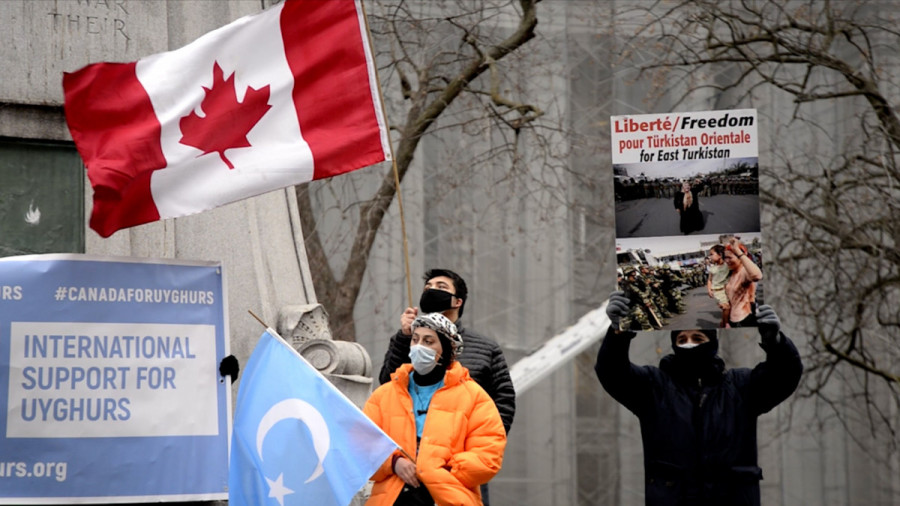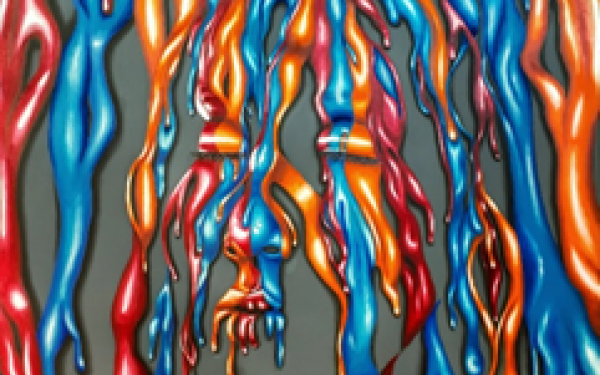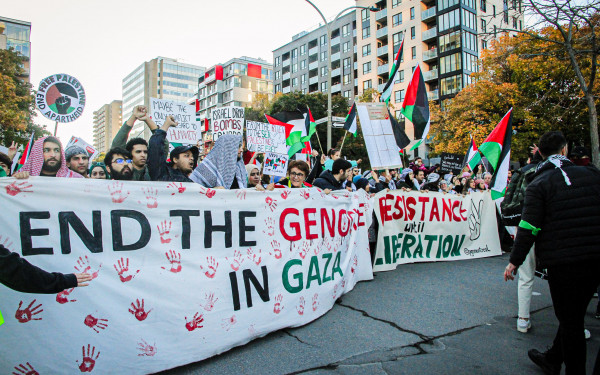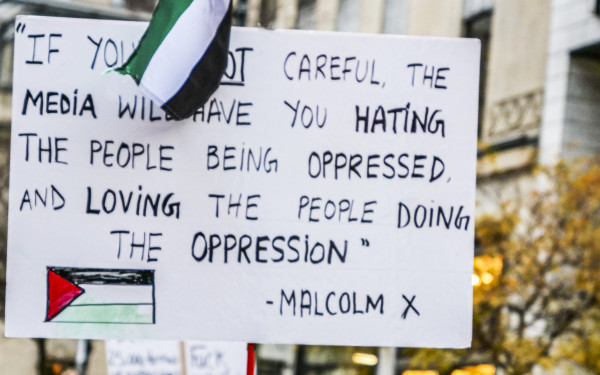March for Uyghurs demands action to stop genocide
Activists say Canada has a role to play in protecting Uyghur human rights
The march began at Dorchester Square on Nov. 15, where dozens of demonstrators and activists braved the cold drizzle to speak against the persecution of Uyghur Muslims in China.
After hearing from speakers explaining the cause and urgency, the crowd marched with assorted flags and symbols of solidarity down René-Lévesque Boul. to their final destination, the Consulate General of the People's Republic of China.
“Since 2016, under secretary general Xi Jinping, conditions have worsened considerably,” said former MP and human rights activist David Kilgour, addressing the crowd. “Increasingly, comparisons are made with the Holocaust.”
“We know from testimonies, leaked official documents and satellite imaging that the government of China is subjecting millions of Uyghurs to concentration camps, forced labour, forced sterilization and mass surveillance, among other horrific conditions which experts say amount to cultural genocide,” Kilgour said.
According to International Support for Uyghurs, a Montreal-based non-profit who organized the march, Uyghur and Turkic people are being oppressed by the Chinese government. Per the ISU website, East Turkestan is the historical homeland of the Uyghurs and other people of Turkic Central Asian background.
Bordered by several countries, including Russia, Pakistan, India, and Afghanistan, East Turkestan has been occupied by China since December 1949. The region has been commonly referred to as Xinjiang since.
Zapaer Alip, a coordinator of ISU and a co-organizer of the march, spoke with The Link about the urgency of the situation and how the Canadian government needs to recognize the genocide, listen to the findings of the Subcommittee on International Human Rights, and take action.
“It’s important to send an economic message to China that […] they can’t be selling Canadians, and the Canadian government, forced labour products.” —Zapaer Alip
“Once it’s recognized as a genocide, Canada has legal obligations to act to make sure they can do their best to [...] reduce the impact as much as possible,” Alip said. This can be done through recognition, immigration, and refugeeship, he added.
Alip said thousands of Uyghurs have managed to escape, some currently residing in Egypt, Indonesia, and Saudi Arabia, among others.
“They’ve come far,” Alip said. “But, they’re in danger because China’s influence is such that [...] we’ve seen people be extradited from Indonesia back to China, which is effectively a death sentence for them.”
The ISU post about the protest describes genocidal methods the Chinese state is said to be using against the Uyghurs under the premise of re-education and cultural assimilation. Among these methods are detention and forced labour camps, brainwashing, sexual abuse, torture, forced sterilization, and even organ harvesting.
“Why is it that we are sacrificing our human rights, our national security, in order to have ‘trade,’” said another speaker, making air quotes.
What can Canada and Canadians do to help?
The protest organizers laid out some important requests for Canada and the broader public, as it claims the pandemic has increased China’s use of forced Uyghur labour to sustain its economy.
“It’s important to send an economic message to China that [...] they can't be selling Canadians, and the Canadian government, forced labour products,” Alip said.
He assures it is not necessary to ban all Chinese products, but that western and Chinese companies need an onus to ensure suppliers and their suppliers are not using forced labour products.
Alip said an ombudsperson exists for these situations, and legislation should be created to ensure measures are put in place to mitigate corporations being able to profit from human rights abuse.

According to The Guardian, much of the fashion industry has ties to forced labour done by Uyghur people. They claim as many as one in five cotton products can be traced back to forced labour and human rights abuses in China.
“It is our responsibility as consumers to change our shopping habits, pressure our governments to act in regards to this problem and help the closure of these forced labour camps,” the ISU urged on their website.
Regarding those who manage to escape, the ISU claims Uyghur refugees around the world are being sent back to China due to some countries’ collaboration with the Chinese government; their fate is possibly a detention or forced labour camp.
“Therefore, we must pressure the Canadian government to take a leading role in the protection of these refugees who have narrowly escaped China’s tyranny.”
In a statement to The Link, Kyle Matthews, executive director of the Montreal Institute for Genocide and Human Rights Studies, described the persecution of the Uyghur Muslim minority group in China as one of the most serious human rights crises in the world today.
Matthews explained China's economic power and willingness to punish countries who challenge their human rights record is part of the reason countries like Canada should take action.
“It is imperative that other states work in a unified manner to impose economic sanctions against all individuals responsible for orchestrating these crimes against humanity,” Matthews said.
MP and deputy leader of the New Democratic Party, Alexandre Boulerice took the stand.
“As a democracy, if we believe in our values and principles, we must defend human rights worldwide,” said Boulerice to the applauding crowd. “Why are we putting people in jail for who they are?”
Canada should recognize the genocide and commence refugee processing to facilitate Uyghurs coming to Canada to start a life and enjoy safety, Alip said.
Alip said making an effort to buy locally is not only good for the local economy, but also ensures consumers are not buying products made by forced labourers who are being targeted by a genocide.
The march, per Alip, aims to urge minister of foreign affairs François-Philippe Champagne and minister of immigration Marco Mendicino to take action immediately. The hope is these ministers would be able to commence the process of recognizing a genocide and Canada will begin to accept refugees.
“That’s why we’ve come out in this horrible cold weather, during this COVID time, to send a message to our ministers,” Alip said.





_2_600_375_90_s_c1.jpg)